2023 EXPRESS: West Coast Exploration (AUV and Mapping)
(EX2309)
Exploration Team
Naming every expedition participant in a telepresence-enabled mission is next to impossible! Many researchers from dozens of institutions across the country have provided input into the expedition plan and are expected to participate. However, we've assembled information about the members of the team who are physically onboard NOAA Ship Okeanos Explorer.
And of course, none of this exploration would be possible without the work of the dedicated NOAA Commissioned Officer Corps and civilians who operate NOAA Ship Okeanos Explorer as part of NOAA's fleet managed by NOAA's Office of Marine and Aviation Operations.

Kasey Cantwell
Expedition Coordinator, Operations Chief, NOAA Ocean Exploration
Kasey Cantwell is the operations chief for the Expeditions and Exploration Division of NOAA Ocean Exploration. Kasey has a master’s degree in marine affairs and policy and marine geology and geophysics and a bachelor’s degree in marine science and biology, both from the University of Miami Rosenstiel School of Marine and Atmospheric Science. Kasey joined NOAA Ocean Exploration in 2012 and is responsible for overseeing the office’s operational portfolio, including telepresence-enabled expeditions conducted aboard NOAA Ship Okeanos Explorer. In her previous role as an expedition coordinator for remotely operated vehicle expeditions, she coordinated over a dozen expeditions and projects, including multidisciplinary expeditions to the Atlantic submarine canyons, the Mariana region, Pacific Remote Islands Marine National Monument, now known as Pacific Islands Heritage Marine National Monument, Glacier Bay National Park, and offshore the southeastern United States. Beyond deep-sea exploration, Kasey’s background includes imagery-based mapping of coral reefs throughout the Caribbean, long-term ecosystem monitoring, and evaluating resource management strategies to improve efficiency and data quality.

Shannon Hoy
Expedition Mapping Lead, Expedition Coordinator Team Lead, NOAA Ocean Exploration
Shannon Hoy is the Expedition Coordinator Team Lead with NOAA Ocean Exploration. She has always had a love of the ocean and started going to sea as an undergraduate on numerous seafloor mapping missions. On two of these expeditions, she was a NOAA Ocean Exploration explorer-in-training on NOAA Ship Okeanos Explorer! Now she leads field expeditions aboard Okeanos Explorer using a variety of tools such as multibeam sonars and remotely operated vehicles to map and explore remote and/or poorly understood areas of our ocean. When not in the field, she focuses on improving NOAA Ocean Exploration's operational efficiency and effectiveness and works to improve the pace and quality of ocean mapping as an active participant in the global mapping community. Her specialty is in deepwater ocean mapping and she received a master’s degree in Earth Sciences: Ocean Mapping from the University of New Hampshire.

Leonardo Macelloni
Autonomous Underwater Vehicle Team Lead, Research Associate Professor, University of Southern Mississippi School of Ocean Science and Engineering
Leonardo (Leo) Macelloni is a research associate professor at University of Southern Mississippi’s School of Ocean Science and Engineering. He is a marine geophysicist with over 15 years of experience in ocean science and exploration with both academia and industry. Leo is an Italian native and received his Master of Science in geology (2001) and doctorate in applied geophysics (2005) from Sapienza University of Rome. Leo led the effort of the high-resolution mapping of the Hudson Canyon and the bio-geological characterization of several natural hydrocarbon seeps in the Gulf of Mexico, Atlantic, and Mediterranean Sea. Leo’s research interests are advanced seafloor mapping using uncrewed vehicles, sediments geo-mechanics and petrophysics, marine mineral resources, and alternative energy. In 2014, Leo was awarded the prestigious European Union Marie Curie Fellowship.
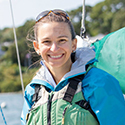
Katy Croff Bell
Founder and President, Ocean Discovery League
Dr. Katy Croff Bell is the Founder and President of the Ocean Discovery League and a National Geographic Explorer. She is on a mission to break down the barriers to the deep sea by combining low-cost technologies, artificial intelligence (AI)-driven data analysis, and capacity building to make access to the deep sea more efficient and accessible to all, especially those historically excluded in the field. Her background in ocean engineering, maritime archaeology, and geological oceanography, and leadership of dozens of expeditions around the world uniquely position her to create efficient, equitable systems to broaden access to the deep sea.
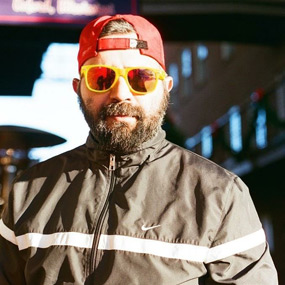
Marco D’Emidio
Autonomous Underwater Vehicle Team Lead, Senior Research Scientist, University of Southern Mississippi School of Ocean Science and Engineering
Marco D’Emidio grew up in Civitella del Tronto, a little town on the east coast of central Italy. In 2007 he received his master’s degree in geology from Sapienza University of Rome. After working as geologist and geophysicist for a private Italian geophysical surveying company, Marco joined the University of Mississippi’s Mississippi Mineral Resources Institute (MMRI) in 2010 as a GIS spatial analyst. Marco soon became chief navigator and mapper for MMRI remotely operated vehicle and autonomous underwater research expeditions, participating in 40+ expeditions. In 2021, Marco joined the University of Southern Mississippi as senior research scientist, specializing in multibeam (seafloor mapping, backscatter, water column), side-scan sonar data acquisition and processing, and managing AUV operations, planning, and logistics.

Bradley Battista
Autonomous Underwater Vehicle Team Member, University of Southern Mississippi School of Ocean Science and Engineering
Bradley Battista is a transdisciplinary geoscientist and certified geospatial intelligence professional with expertise in geospatial, geophysical, and remote sensing data processing, management, and fusion. He has led the development and implementation of innovative geotechnology solutions for various industries and domains involving centralized and distributed computing in conventional and unconventional environments. He has also conducted extensive research and published papers on topics such as nonlinear signal processing, energy and climate feasibility, and embedded systems. He is proficient in various geospatial software, programming languages, and web GIS technologies.
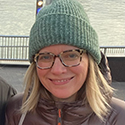
Courtney Crouse
Lead Naval Architect, NOAA Platform and Infrastructure Acquisition Division (PIAD)
Courtney Crouse grew up in Michigan and has a bachelor’s degree from the University of Michigan in Naval Architecture and Marine Engineering (2000) and a non-technical master’s degree from St. John’s College in Annapolis (2016). She worked as a naval architect at Ingalls Shipbuilding, Herbert Engineering, and ECS as a contractor for NOAA before joining NOAA in 2022. She has a special interest in research vessels due to a lifelong interest in the ocean, exploration, the environment, and advanced technologies. As part of the PIAD team, she is involved in NOAA’s fleet recapitalization efforts which involves the procurement of three new classes of vessels as well as supporting NOAA’s net-zero emissions effort. Her purpose onboard was to engage the ship’s crew and science team with questions related to modification of the new vessel NOAA Ship Discoverer (to provide to the team working at home), to better understand the operations of the vessel and to generally get feedback from the crew to help inform future acquisitions.
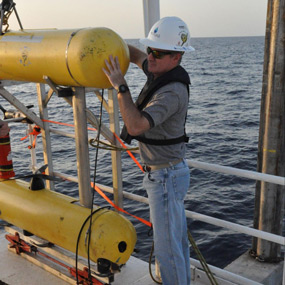
Roy Jarnagin
Autonomous Underwater Vehicle Team Member, Senior Research Engineer, University of Southern Mississippi School of Ocean Science and Engineering
Roy Jarnagin is a senior research engineer with the University of Southern Mississippi’s Hydrographic Sciences Research Center. His area of expertise is uncrewed maritime vehicles with a primary focus on autonomous underwater vehicles. He holds a Master of Science degree in ocean engineering from Florida Atlantic University and Master of Science degrees in systems engineering and engineering technology from the Southern Polytechnic College of Engineering and Engineering Technology at Kennesaw State University. In addition to more than eight years of experience in the marine vehicles field, Roy has more than twenty years of experience developing electronic systems in various industries. He has co-authored several conference papers on topics related to marine robotics.
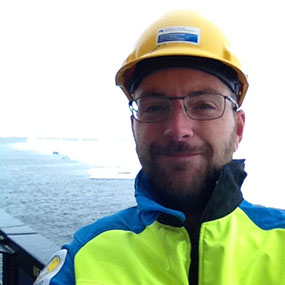
Kevin Jerram
Mapping Specialist, Center for Coastal and Ocean Mapping / Joint Hydrographic Center at the University of New Hampshire
Kevin Jerram is a mapping specialist with the Center for Coastal and Ocean Mapping / Joint Hydrographic Center at the University of New Hampshire (UNH). His first experience aboard NOAA Ship Okeanos Explorer was an expedition to acoustically characterize deep methane seeps in the Gulf of Mexico in 2011, forming the basis for his master’s thesis in ocean engineering at UNH. Since then, Kevin has supported 60 mapping missions throughout the Atlantic, Pacific, and Arctic Oceans aboard a wide variety of vessels. He was initially drawn to ocean mapping because it blends engineering with exploration. Highlights aboard expeditions on Okeanos Explorer include making high-resolution maps for use by the remotely operated vehicle team and scientists in unexplored areas. Beyond work on Okeanos Explorer, Kevin works with the National Science Foundation-funded Multibeam Advisory Committee (MAC) to maintain mapping system performance within the U.S. academic research fleet and develops publicly available Python apps to assess multibeam data quality. These resources are available through the Ocean Mapping Community Wiki, co-founded by the MAC with partners from NOAA Ocean Exploration and industry.
When back on land, Kevin can be found fixing up his good old house and good old boat on Penobscot Bay in Maine.
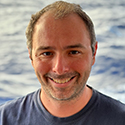
Brian Kennedy
Chief Scientist, Ocean Discovery League
Dr. Brian Kennedy is a deep-sea ecologist who has spent over a decade in ocean exploration. His basic research focuses on understanding how environmental drivers influence deep sea organisms. As part of that work, he is always looking for ways to increase the pace and efficiency of ocean exploration through both the development of new technologies and the novel utilization of existing technologies in the deep sea. Brian earned his PhD in marine ecology from Boston University, and also holds a Masters in biology (BU) and a bachelors in marine biology (College of Charleston). He has published numerous peer reviewed articles and more than a dozen white papers and other publications relating to deep sea ecology, ocean exploration, and underwater technology development and utilization. Brian is currently the Chief Scientist at the Ocean Discovery League and a visiting researcher at Boston University where he is actively involved in deep sea science and advocacy.
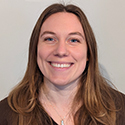
Katie Leeper
Community Engagement Coordinator, Ocean Discovery League
Katie Leeper is originally from the United Kingdom and has bachelor’s and master's degrees in chemistry from the University of Bristol. After spending several years working in volunteer management in London, she relocated to Curaçao, where she has been based for the past six years, working with several coral restoration programs across the Caribbean.
She currently is an independent contractor with the Ocean Discovery League (ODL) team, working as their Community Engagement Coordinator. Her role focuses on supporting the communities that ODL works with across their various programs.
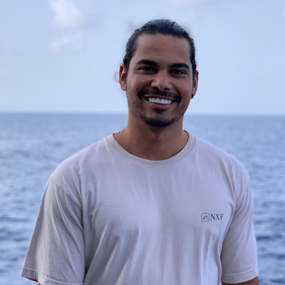
Agno Rubim de Assis
Autonomous Underwater Vehicle Team Member, Graduate Research Assistant (Ph.D. program), University of Southern Mississippi School of Ocean Science and Engineering
Agno Rubim de Assis is a doctoral student under Leonardo Macelloni at the University of Southern Mississippi (USM). He received a Bachelor of Science in oceanography from the Federal University of Espirito Santo in Brazil and has a CAT-A surveyor certification from the master of science program in hydrographic sciences at USM. His research interest is in autonomous underwater and surface vehicles focused on hydrographic surveys. Agno has been involved with several oceanographic expeditions.
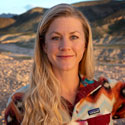
Caitlin Ruby
Data Management Lead, NOAA National Centers for Environmental Information
Caitlin Ruby is a data manager with NOAA’s National Centers for Environmental Information through the University of Colorado’s Cooperative Institute for Research in Environmental Sciences. Caitlin always knew she would someday work in the ocean sciences, and has held positions with the Naval Oceanographic Office, NASA, the Naval Research Laboratory, and NOAA. She earned her bachelor's in geography from the University of Southern Mississippi and her master's degree in geospatial sciences from Mississippi State University. Her graduate research focused on improving the geospatial visualization of NOAA Ocean Exploration’s remotely operated vehicle (ROV) video data. Caitlin is thrilled to work with such a wonderful group of data scientists, researchers, and explorers!
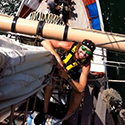
Edward Sweeney
Marine Spatial Ecologist, NOAA’s National Centers for Coastal Ocean Science
Ed Sweeney is a marine spatial ecologist on the Habitat Mapping Team with the NOAA Biogeography Branch, Marine Spatial Ecology Division of the National Centers for Coastal Ocean Science. Ed received his bachelor’s degree in geology from Bowdoin College in Brunswick, Maine, and completed his master’s degree in Earth sciences, focusing on ocean mapping at the University of New Hampshire Center for Coastal and Ocean Science. Prior to working with NOAA, Ed was based out of Woods Hole, Massachusetts, and sailed with Sea Education Association (SEA) Sea Semester program as an onboard scientist (aka, ocean science pirate). He spent most of his time on the high seas aboard the school’s brigantine schooners in the South Pacific, U.S. Atlantic, and European waters. When off the boat, Ed worked with the U.S. Geological Survey Seafloor Mapping Group in the Woods Hole office, helping to re-purpose and characterize previously collected seafloor mapping data. With the Habitat Mapping Team, Ed currently specializes in processing seafloor remote sensing data and photo imagery to create spatial predictions of benthic habitats. When not at work (and sometimes while on lunch break), you can find Ed bodysurfing or running in Santa Barbara, California.
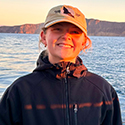
Ami Vice
Undergraduate Student
Ami Vice was born and raised on the island of Guam where she is currently in school finishing a bachelor’s degree in environmental sciences. She is interested in resource management in the field of marine sciences. This was Ami’s first time on an oceanographic research vessel, but she hopes it will not be her last! She thoroughly enjoyed the time she spent on NOAA Ship Okeanos Explorer and is grateful for the people she met and to the Ocean Discovery League, who invited her. She will use this experience to further her studies and work in marine conservation.
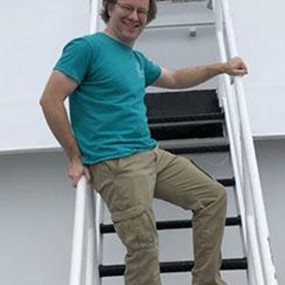
Max Woolsey
AUV Team Member, Undersea Systems Engineer, University of Southern Mississippi School of Ocean Science and Engineering
Max Woolsey received bachelor’s and master’s degrees in electrical engineering from the University of Mississippi. He has over a decade of experience in undersea systems engineering and has worked extensively on applications concerning uncrewed maritime systems. His publications span ecological studies involving seafloor lander experiments, seafloor imagery products, and the design of computational tools for marine research. Max has extensive experience in the design and operation of autonomous vehicles through his work with the National Institute of Undersea Technology and has participated in numerous oceanographic expeditions.